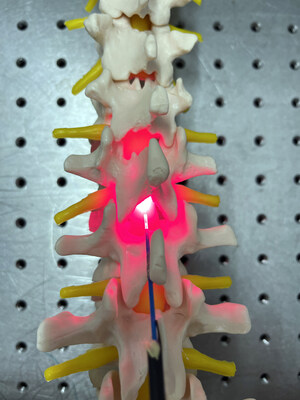Subject: TRI
Red light therapy for repairing spinal cord injury passes milestone
BIRMINGHAM, England, May 6, 2024 /PRNewswire/ -- Patients with spinal cord injury (SCI) could benefit from future treatment to repair nerve connections using red and near-infrared light.
The method, invented by University of Birmingham scientists and patented by University of Birmingham Enterprise, delivers light directly to the site of the injury.
Their latest research, published in Bioengineering and Translational Medicine, determined an optimal 'dose' for this novel approach, and showed it can deliver therapeutic improvements including significant restoration of sensation and movement, and regeneration of damaged nerve cells.
Researchers led by Professor Zubair Ahmed used cell models of SCI to determine the frequency and duration of light required to achieve maximum restoration of function and stimulate nerve cell regrowth.
They found delivery at a wavelength of 660nm for one minute a day increased cell viability (the number of live cells) by 45% over five days' treatment.
Professor Ahmed said: "The effect of 660nm light was both neuroprotective, meaning it improved survival of nerve cells, and neuroregenerative, meaning it stimulated nerve cell growth."
The researchers also investigated the effect of light therapy in preclinical models of SCI, using an implantable device and transcutaneous delivery with the light source placed against the skin. They showed comparable results for both methods, with a one-minute dose of 660nm light, delivered daily for seven days resulting in reduced tissue scarring, increased levels of proteins associated with nerve cell regeneration, improvements in the connections between cells and significant functional recovery.
This is the first time transcutaneous and direct light delivery have been compared in SCI. Professor Ahmed said: "To make light therapy viable for treating SCI in humans an implantable device will be required, to provide line of sight to damaged tissue and the opportunity for greater accuracy and standardise dosing without impedance due to the thickness of the skin and other tissues surrounding the spinal cord."
The researchers are planning to develop an implantable device for use in humans with traumatic SCI. They have already received further funding and are seeking commercial partners or investors to develop a prototype device to take into first-in-man clinical trials.
Full release here.
University of Birmingham Enterprise helps researchers turn ideas into products and services that meet real-world needs. Follow us on LinkedIn and X.
Photo: https://mma.prnewswire.com/media/2404909/University_of_Birmingham_Enterprise.jpg
Media enquiries:
Ruth Ashton
Commercial enquiries:
Veemal Bhowruth
These press releases may also interest you
|
News published on and distributed by:




